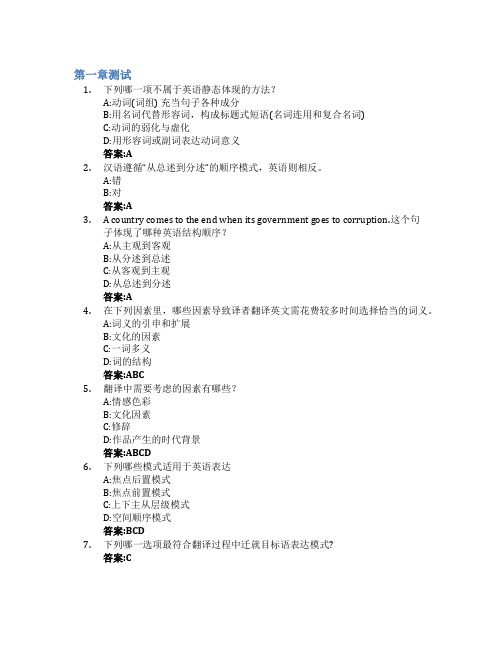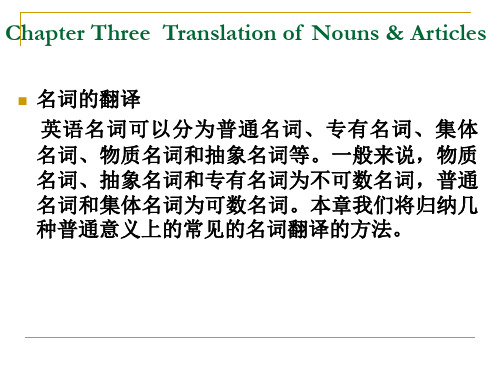第3章 练习答案 名词的抽象和具体译法
名词的抽象和具体译法

• 狗急跳墙→do something desperate • 另一方面,抽象译法也包括带有范畴词的
具体化名词在语言形式上的抽象化译法, 主要是在翻译过程中去掉后面的范畴词, 如:
• 谦虚态度→modesty
• 发展过程→development
3.Her indifference kept all the away from the exhibition hall.
她的冷漠态度把许多参观者挡在展览馆门外。
4.Every life has its roses and thorns.
每个人的生活都有甜有苦。
5.There is a mixture of the tiger and the ape in his nature.
从事教学使我的工作进程有了规律, 使我的生活变得丰富多彩,既向我提 出了挑战,也为我提供了不断学习的 机会。
2.The stars twinkled in transparent clarity.
星星在清澈的晴空中闪烁。
3.Public opinion is demanding more and more urgently that something must be done about air pollution.
翻译的具体和抽象
杨鉴琳 李孟云
原文抽象,译文具体
• 英语抽象名词具体化
• 以具体法补充外围语义成分
• 用形象性词语使抽象意义具体化
英语抽象名词具体化
从词类的使用来看, 英语多用名词,有 静,虚,抽象的特点;汉语多用动词, 有动,实,具体的特点。抽象名词中, 有许多为英语所独有,在汉语中很难 找到对应词。因此,在英译汉时,需 要运用词类的转化,意义的引申或加 适当的范畴词使其具体化,以便符合 汉语的习惯。
英汉翻译基础教程练习答案

英汉翻译基础教程练习答案汉英翻译基础教程第一章汉英词汇比较与翻译 (2)第二章词法翻译的一般技巧 (4)第三章名词的抽象和具体译法 (9)第四章动词的翻译 (11)第五章数词和冠词的翻译 (12)第六章成语的英译 (13)第七章修辞格的翻译 (17)笫八章文化词语的翻译 (19)第九章汉英句子比较与翻译 (20)第十章换序和转态译法 (23)笫十一章断句合句译法 (25)笫十二章长句的翻译 (27)第十四章汉英语篇比较与翻译 (29)第十五章风格与翻译 (30)第十六章语用与翻译 (32)第一章汉英词汇比较与翻译第一节翻译中的选义一、结合语境选择较贴切的译文1. b2. a3. b4. a二、译出下列词语,注意词语的不同搭配1. a swarm of beesa brood of chickensa litter of pups2. a bevy of beautiful ladiesa pack of houndsa team of ducksa herd of antelopes3. unfailing supportproactive fiscal policymake effective use of overseas resources4. make a phone calltake a taxiknit a woolen sweaterfetch waterplay basketballspray insecticide5. basic wagecapital constructionessential commodityprimary industryfundamental interest三、翻译下列句子,注意画线词语的理解1. The two leaders exchanged views on bilateral relations and issues of common concern2. Party members should listen carefully to the opinions of the general public.3. They offered some suggestions for the revision of the plan.4. Everyone complained against such a practice.5. They had a dispute at the meeting.6. You should follow the doctor's advice.7. They reached a consensus on this issue.8. There is still some unfinished business to settle.9. We have consulted him about the matter.10. Please go back. There is nothing of your concern now第二节翻译中的选词一、翻译下列各句,注意词的选择和搭配。
翻译理论与实践智慧树知到答案章节测试2023年湖南中医药大学

第一章测试1.下列哪一项不属于英语静态体现的方法?A:动词(词组) 充当句子各种成分B:用名词代替形容词,构成标题式短语(名词连用和复合名词)C:动词的弱化与虚化D:用形容词或副词表达动词意义答案:A2.汉语遵循“从总述到分述”的顺序模式,英语则相反。
A:错B:对答案:A3. A country comes to the end when its government goes to corruption.这个句子体现了哪种英语结构顺序?A:从主观到客观B:从分述到总述C:从客观到主观D:从总述到分述答案:A4.在下列因素里,哪些因素导致译者翻译英文需花费较多时间选择恰当的词义。
A:词义的引申和扩展B:文化的因素C:一词多义D:词的结构答案:ABC5.翻译中需要考虑的因素有哪些?A:情感色彩B:文化因素C:修辞D:作品产生的时代背景答案:ABCD6.下列哪些模式适用于英语表达A:焦点后置模式B:焦点前置模式C:上下主从层级模式D:空间顺序模式答案:BCD7.下列哪一选项最符合翻译过程中迁就目标语表达模式?答案:C8.以下哪些句子体现了增词翻译原则中的修辞性增词:A:At thirty-five, she had first learned what it is to be a mother. “她到35岁的时候才生平第一次尝到做母亲的滋味。
”B:There has been too much publicity about the case. “那件案子已经搞得满城风雨,人尽皆知了。
”C:We couldn’t count on his rationality. “我们不能指望他会讲道理。
”D:A. “Sesame street” is popular among children. “芝麻街少儿频道再儿童中很受欢迎。
”答案:AB9.英语表达中,动词地位不平等是客观存在的事实,主要体现在A:过去分词结构B:不定式结构C:现在分词结构D:无动词结构答案:ABCD10.汉语结构中主语缺失是一种十分普遍的现象,而英语中是不允许存在的。
科技英语翻译课后练习答案

目录1
第1章 概论 1、翻译的标准 2、对译者的要求 3、科技英语文体的特点 4、翻译的一般方法
第2章 词的翻译 1、词义的选择 2、词义的引申 3、词类的转换 4、词的增译 5、词的省译 6、重复法
第3章 名词和冠词的翻译 1、名词的译法 2、冠词的译法 3、总复习题
第4章 代词的翻译 1、代词的一般译法 2、人称代词的译法 3、形容词性物主代词的译法 4、指示代词的译法 5、不定代词的译法 6、it及其句型的译法 7、总复习题
2.2 词义的引申
1. 技术性引申 2. 修辞性引申 3. 具体化引申 4. 抽象化引申
人们发现钻孔速度与工具所受的净压力成正比。
2. Scientists are constantly striving to find fast and convenient way of obtaining quantitative data.
科学家们总是力求找到快速而简便的方法获得定量数据。
3. To find the area of a square or oblong, you merely multiply its length by its width.
立体角 整体轴承 固体 实线 钻头
单色 实心曲轴 赤金 体积 固态电路 无气喷射 润滑脂,固体润滑剂 磁极
第1节 翻译练习4
apron (n.): ► 机械行业 ► 造船业 ► 建筑业 ► 地质 ► 运输业 ► 航空业 ► 军事
护床 船头护船木 护墙,挡板 冰川前的沙砾层 (皮带)运输机
停机坪 (炮的)口罩,伪装天幕
制造过程可以分为单件生产和大量生产。前者指的是生产少 量的零件,后者则是指生产大量相同的零件。(分译)
汉英翻译基础教程 期末考试总结

第三章名词的抽象和具体译法第一节名词的抽象译法(p68)粗枝大叶to be crude and careless (with big branches and large leaves)海阔天空to talk with random(with a vast sea and boundless sky)灯红酒绿dissipated and luxurious (with red lights and green wine)纸醉金迷of life of luxury and dissipation (with drunken paper and bewitched gold)单枪匹马to be single-handed in doing sth (with a solitary spear and a single horse)赤胆忠心ardent loyalty (with red gut and heart)无孔不入to take advantage of every weakness (to get into every hole)扬眉吐气to feel proud and elated (to raise the eyebrows and let out a breath)开门见山to come straight to the point (to open the door and see the mountain)大张旗鼓on a large and spectacular scale (to make a great array of flags and drums)风雨飘摇(of a situation) being unstable (the wind and rain are rocking)二.翻译下列句子(1)这是他们夫妻之间的事情,你去插一脚干吗?That’s a business of their own, between husband and wife. Why should you get involved in? (2)别人家里鸡零狗碎的事情你都知道得这么全,真是个顺风耳啊!You know all the bits and pieces of trifles of other families。
科技英语翻译-第3章

Chapter Three Translation of Nouns & Articles
名词的翻译 一、直译 所谓直译,就是把原文中名词或名词短语本身的含义翻 译出来。如: A power reactor has no need of air, for the heat generated in the uranium pile is the result of unclear fission, not of combustion. 动力反应堆不需要空气,因为在铀堆中产生的热室核裂 变而不是燃烧的结果。 Differentiation can also be expressed in terms of biochemical activities. 分化也可以用生化活动来表达。
Chapter Three Translation of Nouns & Articles
名词的翻译 三、增译 名词的增译多数是为了使译文更符合汉语的表达方式与习惯。如: Breeding of hummingbirds takes? place in May and June. 蜂鸟生育繁殖的时间是每年的五月和六月。 译文在breeding后增译了“时间”;在in May and June前增译了 “每年”,使整个句子读起来更加通顺,意思表达更准确完整。 A drilled hole can be made accurate and smooth by a? reamer. 钻好的孔可用铰刀加工,使其尺寸精确,表面光滑。 该句在形容词accyrate and smooth前分别增译了名词“尺寸”和 “表面”,译文的意思表达的更明确一些。
Chapter Three Translation of Nouns & Articles
【VIP专享】英汉翻译基础教程练习答案总主编冯庆华
汉英翻译基础教程第一章汉英词汇比较与翻译 (2)第二章词法翻译的一般技巧 (4)第三章名词的抽象和具体译法 (9)第四章动词的翻译 (11)第五章数词和冠词的翻译 (12)第六章成语的英译 (13)第七章修辞格的翻译 (17)笫八章文化词语的翻译 (19)第九章汉英句子比较与翻译 (20)第十章换序和转态译法 (23)笫十一章断句合句译法 (25)笫十二章长句的翻译 (27)第十四章汉英语篇比较与翻译 (29)第十五章风格与翻译 (30)第十六章语用与翻译 (32)第一章汉英词汇比较与翻译第一节翻译中的选义一、结合语境选择较贴切的译文1. b2. a3. b4. a二、译出下列词语,注意词语的不同搭配1. a swarm of beesa brood of chickensa litter of pups2. a bevy of beautiful ladiesa pack of houndsa team of ducksa herd of antelopes3. unfailing supportproactive fiscal policymake effective use of overseas resources4. make a phone calltake a taxiknit a woolen sweaterfetch waterplay basketballspray insecticide5. basic wagecapital constructionessential commodityprimary industryfundamental interest三、翻译下列句子,注意画线词语的理解1. The two leaders exchanged views on bilateral relations and issues of common concern2. Party members should listen carefully to the opinions of the general public.3. They offered some suggestions for the revision of the plan.4. Everyone complained against such a practice.5. They had a dispute at the meeting.6. You should follow the doctor's advice.7. They reached a consensus on this issue.8. There is still some unfinished business to settle.9. We have consulted him about the matter.10. Please go back. There is nothing of your concern now第二节翻译中的选词一、翻译下列各句,注意词的选择和搭配。
抽象与具体译法
会上,两方发生争执,一方拂袖而去。 The two parties fell into fierce dispute. At last one party got up abruptly and walked off in a huff.
静谧的小巷里想起了清脆的自行车铃声。 The crisp jangling of the bicycle rises from the
quite alley.
2020/1/18
Байду номын сангаас
C-t-E Translation
18
他每天要处理许多棘手的问题。 He has many hot potatoes to handle everyday.
2020/1/18
C-t-E Translation
5
抽象译法一方面把比喻形象上较为具体的单词词 组或成语进行抽象概括,如:
开门见山→come straight to the point 狗急跳墙→do something desperate
另一方面,抽象译法也包括带有范畴词的具体化 名词在语言形式上的抽象化译法,主要是在翻译 过程中去掉后面的范畴词,如:
•我们都来自五湖四海。 •We are from all corners of the country.
•不知黄连苦,怎知蜂蜜甜。 •Who has never tasted bitter knows not what is sweet.
2020/1/18
C-t-E Translation
8
具体译法指的是在翻译过程中把原文中抽象 的成分用具体的成分表达出来,从而消除或 降低语言差别给翻译带来的损失,使译文产 生与原文同样的效果。
Chapter 名词的抽象和具体译法
练习: 他们的乐观主义精神令我们大为感动。
Their optimism moved us greatly.
三、抽象译法句子翻译
例:我明白许多家庭今天都意识到他们家中少了人. I knew that many families today were conscious of absences.
二、成语和习语的抽象译法
粗枝大叶:
with big branches and large leaves 正译: to be crude and careless
海阔天空:
with a vast sea and boundless sky 正译:to talk with random
单枪匹马:
with a solitary spear and a single horse 正译:to be single-handed in doing sth
主要旅游观 光场所
the major tourist attractions
波士顿的知识 the educated
界人士
Boston
汉语命名中倾向于增加范畴词, 如"问题"、"态度"、" 局势"、“现象”等,这 些词有的是出于表达形象具体的需要, 有的则是修辞上的需要,没有实质意义。 英译时都可以用抽象的词语来表达,进行抽象化处理。
三、抽象译法句子翻译
练习: 1.不知黄连苦,怎知蜂蜜甜。 Who has never tasted bitter knows not what is sweet. 2.我们都来自五湖四海。 We are from all corners of the country.
名词的具体译法 汉翻英
• 苏小姐举止大方,谈吐不俗,引起阵阵惊 • 羡。 • Miss Su was greatly admired for her • charming manners and pleasant • conversation.
五)拟声词的翻译 (一)音译法
有些汉语拟声词在英语中没有对应词。 翻译中若需保留此修辞手法,可采用音译 法,即创造新的拟声词。 拟声造词不等于死译汉语发音,往往 要加小音。比如,木鱼的“笃笃”声可译 成rock-tock;鸟的“唧唧”声可译成jigjig 例: 1.·咦,奇怪。 Well, that‘s strange. 2.哦,这屋子怎么闷得很。
二 补充法
即原文没用拟声词,为使译文形象生动而增添 拟声词的方法。主要适用于以下情况: 1.汉语中非生物的声音常笼统地用“…… 声”或“……响”来描述,不附加拟声词。英 语中,各种非生物的声音一般都有专词表达。 英译时,为增加语言的具体性,可以借助于这 些专门词汇。例如: (1)工地上传来了马达声。 From the construction site comes the rumbling of the machines. (2)清幽的小巷里响起了清脆的自行车铃声 I heard the crisp jangling of the bicycle rising from the quiet alley.
பைடு நூலகம்
练习2
• 拿手好戏 • masterpiece • 赔了夫人又折兵 • throw good money after bad • 文韬武略 • military expertise; military strategy
名次具体译法句子的翻译
• 我们公司的家具设计时尚,色彩高雅,品 • 质一流。 The furniture manufactured by our company is chic in design, elegant in color and superb in quality.
- 1、下载文档前请自行甄别文档内容的完整性,平台不提供额外的编辑、内容补充、找答案等附加服务。
- 2、"仅部分预览"的文档,不可在线预览部分如存在完整性等问题,可反馈申请退款(可完整预览的文档不适用该条件!)。
- 3、如文档侵犯您的权益,请联系客服反馈,我们会尽快为您处理(人工客服工作时间:9:00-18:30)。
第三章名词的抽象和具体译法
第一节名词的抽象译法
一、翻译下列词语。
1. clean hands
2. six of one and half a dozen of the other
3. a drop in the ocean
4. castle in the air
5. far-sightedness
6. a gentleman's agreement
7. rain cats and dogs
8. as poor as a church mouse
9. touchstone
10. butter sb. Up
二、翻译下列句子,注意画线部分名词的抽象译法。
1. With his tardiness, carelessness and appalling good humor, we were sorely perplexed.
2. No news is good news.
3. Their optimism moved us greatly.
4. At present, the business in our company is turning for the better.
5. Their enthusiasm is being constantly heightened by China's socialist industrialization and its achievement.
6. Now birth control has become a possibility.
7. They admitted the greatness of Milton as a poet, but denied his goodness as a man.
8. I am sorry for the rudeness of his behavior toward you.
9. We should dare to combat indiscipline and inefficiency.
10. During the talks, their discussion has been centered around protection of intellectual property rights.
笫二节名词的具体译法
一、运用具体译法翻译下列词语和句子。
1.as tall as Maypole
2. a piece of cake
3. a capital knife and fork
4. bread and butter
5.bread and cheese
6. The proof of the pudding is in the eating
7. He was born with a silver spoon in his mouth.
二、翻译下列词语或句子,注意象声词的具体译法。
1. the clicker-clack of the leather shoes
2. the clangor of the gong
3. the tick-tack of the watch
4. the rumbling (rolling) of the thunder
5. the squeaking of the radi0
6. the thumping of the bus
7. the clatter of mahjong
8. the jingle of the door bell
9. The bird-song and the babbling of the streams danced lightly in the spring breeze.
10. All was quiet in and out of the house except for some people snoring, the horses chewing
mash, and the geese cackling at intervals.。
